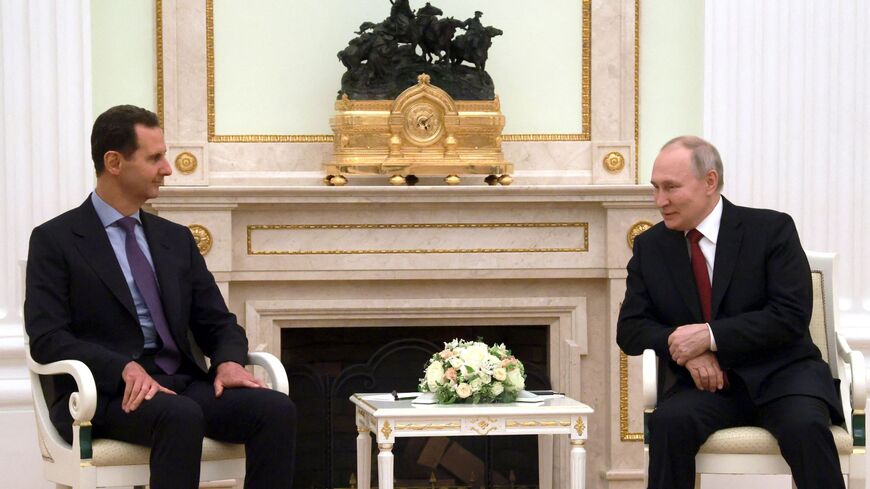Syrian President Bashar al-Assad's visit to Moscow this week was his first following regular protocol, rather than as a special operation, reported only after the fact.
His trip was even preceded by an announcement. Russian newspaper Vedomosti reported on March 6 about the preparations for the official visit.
Assad's reception at Vnukovo Airport's government terminal included a red carpet, a guard of honor and an orchestra. Deputy Foreign Minister Mikhail Bogdanov, Russian Ambassador to Syria Alexander Yefimov and Syrian Ambassador to Moscow Bashar al-Jaafari were waiting for him at the ramp.
Assad had previously been flown to Russia four times in secret, from 2015 to 2021. As Russian experts noted, this visit — “as public and official as possible” — not only “indicates the changed global situation, but also certain expectations” of Moscow and Damascus from the negotiations.
#Syria #Russia : #Assad arrives for official visit in Moscow where he’s due to meet #Putin #سُورِيَة #ٱلْأَسَدِ pic.twitter.com/jZ8q2r1ifH
— sebastian usher (@sebusher) March 14, 2023
However, there were still some oddities. Footage of Assad's meeting at the airport has been edited to avoid showing the plane that took him to Moscow. Contrary to claims by Russian experts that “Assad is no longer under threat,” the Syrian president appears to have been flown to Vnukovo on an IL-62M aircraft of the Russian Defense Ministry, used by various Russian officials, via a detour through Jordanian and Iranian airspace.
Moscow also attempted to formalize the visit by adding to the program Assad's participation in the laying of flowers at the Tomb of the Unknown Soldier in Alexandrovsky Garden, with a military guard of honor. In addition, the talks in the Kremlin were held with delegations involving the ministers of economy, defense and finance.
This did not, however, remove the questions that many foreign policy experts were asking: Why had the usual rules of diplomatic protocol not been followed before? Why didn't anyone meet Assad at the plane's ramp with a red carpet and record the protocol footage, which could be published after the fact? Or has his importance suddenly increased so dramatically for the Kremlin?
Prompted by Arab engagement
The questions are indeed important, since such nuances often make up Middle Eastern foreign policy. There could be at least two reasons for Russia's new approach. The first is that Moscow has taken into account Assad's recent trips to the United Arab Emirates and Oman, without any Russian patronage. The second is that Moscow decided to do Assad a favor because it also needs something from him, namely his agreement to continue contacts with Turkey and a possible meeting with Turkish President Recep Tayyip Erdogan, an important trading partner of Moscow.
In his meeting with Russian President Vladimir Putin, Assad thanked the Russian side for literally everything, as the Russian newspaper Kommersant put it. Nevertheless, such complimentary rhetoric from Assad does not really indicate much. An Al-Monitor source in the Russian diplomatic corps noted that during the numerous visits of Russian delegations to Damascus to prepare the regime for talks with the opposition, Assad has always expressed the same readiness to accept Russian initiatives. “But in fact with the same zeal he sabotaged and stalled all proposals after Russian delegations left the presidential palace,” said a source who has first-hand knowledge of Russian-Syrian relations.
Symptomatically, the day after the Assad-Putin talks, it became known that a meeting of the deputy foreign ministers of Turkey, Russia, Iran and the Syrian regime had been postponed for “technical reasons.” A former Russian diplomat said: “There was obviously force majeure, and it is quite possible that this force majeure was Assad himself with his interview to the Russian agency Sputnik, in which he actually gave Turkey the previous ultimatum in plain language and abandoned the talks.”
Reconstruction hopes 'evaporated'
On the one hand, living conditions in Damascus-controlled territories continue to deteriorate, and the population's hopes for Russian participation in the reconstruction of Syria have evaporated. In this respect, any concessions from Moscow — whether with the opposition in Astana or with Turkey — are obviously not a necessity for Assad, and he can be stubborn. On the contrary — given the war in Ukraine — it is Moscow that now needs the Syrian bridgehead and freedom of action in the Mediterranean region more than Assad needs the Russian presence.
On the other hand, Assad is already actively engaging with regional players on his own, and the Kremlin fears certain maneuvers behind its back, as demonstrated by the escalating situation in Idlib in 2020 related to the Syrian-Emirati agreements.
Moscow is well aware of the Syrian regime's urgent need for constant supplies of oil and building materials, but has been in no hurry to help all these years. Moscow's restraint was not due to the threat of sanctions but to the fact that businesses have no incentive to work at a loss. Apparently, after all the extensive sanctions and related losses, the Russian businessman has little reason to reconsider his previous position.








